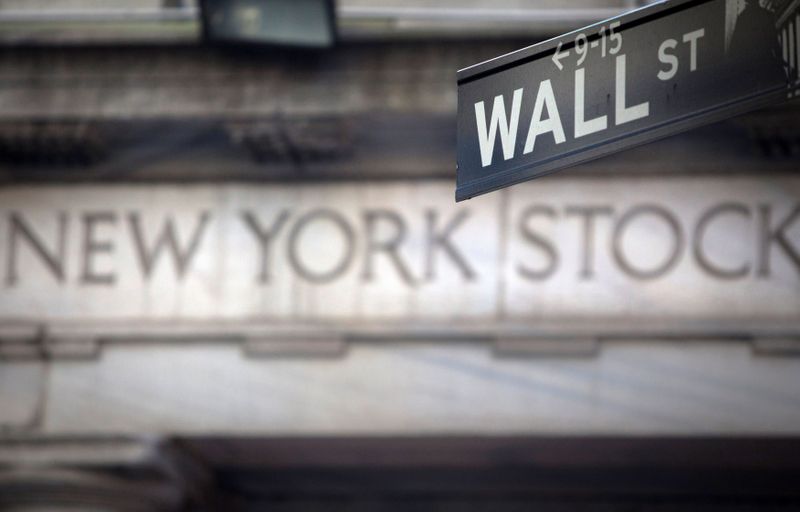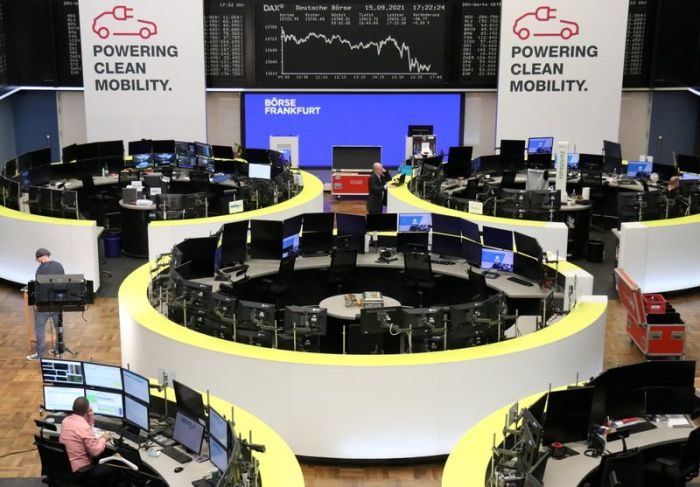NEW YORK (Reuters) -Global share markets edged lower globally on Thursday as concerns about investments in China and a mixed day on Wall Street outweighed positive economic data in the United States.
The three major indexes spent much of the day in negative territory as rising U.S. Treasury yields pressured market-leading tech stocks, and the rising dollar weighed on exporters.
International investors who have been piling into China in recent years are now bracing for one of its great falls as the troubles of over-indebted property giant China Evergrande come to a head.
Dwindling resources set against 2 trillion yuan ($305 billion) of liabilities have wiped nearly 80% off the developer’s stock and bond prices, and an $80 million bond coupon payment now looms next week.
Hong Kong’s Hang Seng index dropped to its lowest level so far this year.
A report from the U.S. Commerce Department on Thursday showed retail sales unexpectedly rose in August, indicating America’s economic recovery is strengthening on positive trends in consumer spending.
The strong data sent safe-haven gold down nearly 3%.
However, the U.S. labor market remains under pressure, with initial jobless claims rising by slightly more than expected last week.
“(Retail spending) categories that were strongest in August were in COVID-beneficiary categories,” wrote Ellen Zentner, chief U.S. economist at Morgan Stanley.
“Now incorporating today’s retail sales release, we lift our real (personal consumer expenditures) tracking to +1.9% and GDP to +5.0%.”
The MSCI world equity index was last down by 0.25% , off an all-time high on Sept. 7. MSCI’s broadest index of Asia-Pacific shares outside Japan closed down 0.83%.
European equities bucked the trend, and Europe’s STOXX 600 closed up 0.44% .
The Dow Jones Industrial Average fell 63.07 points, or 0.18%, the S&P 500 lost 6.95 points, or 0.16%, and the Nasdaq Composite added 20.40 points, or 0.13%.
Markets remain focused on next week’s Federal Reserve meeting for clues as to when the U.S. central bank will start to taper stimulus, especially after the flurry of U.S. economic data out this week.
On Tuesday, data from the U.S. Labor Department showed inflation cooling and having possibly peaked, but inflation in Britain was the highest in years, according to data on Wednesday.
The dollar index rose 0.441%, with the euro down 0.41% to $1.1767.
The yield on 10-year Treasury notes US10YT=RR was up 2.9 basis points at 1.333%.
Spot gold dropped 2.3% to $1,751.53 an ounce. U.S. gold futures fell 2.27% to $1,751.70 an ounce.
Oil prices steadied on Thursday after hitting a multi-week high a day earlier as the threat to U.S. Gulf crude production from Hurricane Nicholas receded.
Brent crude LCOc1 ended the session up 21 cents, or 0.3%, at $75.67 a barrel. On Wednesday Brent touched $76.13, its highest since July 30.
(Reporting by Elizabeth Dilts Marshall; editing by David Evans, Steve Orlofsky and Sonya Hepinstall)

























